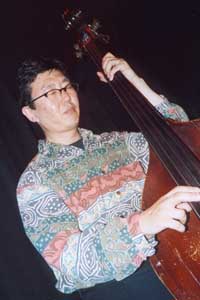February-March Highlights
 Judas Iscariot, by Michel Östlund | |
Department of Music and Rockefeller Memorial Chapel
Combined University Choirs
8 p.m. Saturday, Feb. 26
Rockefeller Memorial Chapel, 5850 S. Woodlawn Ave. 702-8069. http://music.uchicago.edu. Tickets available only at the door. $10 adults, $5 students and children.
In a program titled “In the Glorious Company of the Apostles,” the Motet Choir, the Rockefeller Chapel Choir, the Women’s Chorus and the University Chorus will celebrate the works of Swedish artist Michel Östlund, whose paintings of the Apostles and Paul are currently on display in the chapel. The program includes music by Swedish composers Sandström, Hammarström and Edlund, as well as works written in praise of the Apostles by Dufay, Mulet and Mendelssohn. Interspersed with the pieces, Östlund will discuss the exegesis of his exhibited artwork. The exhibition will be on display through Thursday, March 31.
 Bassist Tatsu Aoki will accompany his own film | |
WHPK and the Film Studies Center
Pictures and Sounds 2005
7 p.m. Saturday, Feb. 26
Film Studies Center, Cobb Hall, Room 307, 5811 S. Ellis Ave. http://whpk.uchicago.edu/events/. Free.
This annual multimedia event pairs silent films with live musical accompaniment. This year, four renowned performers will improvise to a century’s worth of classic experimental cinema. Tatsu Aoki, a fixture in Chicago’s traditional jazz scene, will accompany his film Puzzle III on the acoustic bass. Azita, who became an icon in Chicago’s avant-garde scene in the early 1990s, will craft an improvised piano score to Harry Smith’s experimental Early Abstractions, 1939-1956. Philadelphia musician Fursaxa will play acoustic guitar and electronic loops over Stan Brakhage’s early films, Sirius Remembered and The Dead. Finally, Plastic Crimewave, a key figure in contemporary space-rock/psychedelia music, will accompany Georges Méliès’ A Trip to the Moon.
 University Ballet dancers | |
University Ballet
The Story of Swan Lake
8 p.m. Friday, Feb. 25, and Saturday, Feb. 26
International House, Assembly Hall, 1414 E. 59th St. 702-8068.
http://uballet.uchicago.edu. Tickets available at the door only. $10 general, $5 students.
This two-part show includes The Story of Swan Lake, based loosely on the Swedish National Ballet’s 1996 version of Swan Lake, and Classic Meets Cuba by the Klazz Brothers and Cuban Percussion. The first half of the show brings to the University one of classical ballet’s most beloved works, and the second half features all original choreography by University Ballet dancers.
 Valerie Smith | |
The Committee on Cinema & Media Studies
2005 Oscar Micheaux Lectures on Race and Media
5 p.m. Friday, Feb. 18, and 4:30 p.m. Monday, Feb. 21
Friday’s lecture will be held at the Film Studies Center, Room 307, Cobb Hall, 5811 S. Ellis Ave.
Monday’s lecture will take place in the Biological Sciences Learning Center, Room 001, 924 E. 57th St. 834-1077. Free and open to the public.
The Oscar Micheaux Lecture Series, named after one of the most important African-American independent filmmakers of the early 20th century, brings filmmakers and scholars to Chicago to discuss how race and media culture continue to shape each other, as well as public discourses. This year’s speakers are Frances Negrón-Muntaner, an independent filmmaker from Columbia University, and Valerie Smith, the Woodrow Wilson professor of literature at Princeton University and director of its African American Studies Program. At 5 p.m. Friday, Feb. 18, Negrón-Muntaner will give a lecture titled “Besides Identity: Jose Padilla, Latinos and the War on Terrorism,” which will explore Padilla’s case and encroachments on citizens’ rights. At 4:30 p.m. Monday, Feb. 21, Smith will speak on the topic “Memory and Civil Rights,” which will examine the ways in which recent films like Spike Lee’s Four Little Girls (1997) and Clark Johnson’s Boycott (2001) represent the U.S. Civil Rights Movement.
![[Chronicle]](/images/sidebar_header_oct06.gif)